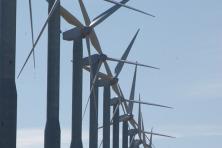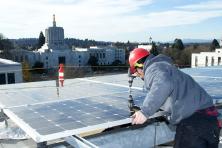Image

EDMUND GARMAN
We won! Clean air and fuel choices for Oregon
We won! This week the Oregon House of Representatives voted to lift the sunset on Oregon’s Clean Fuels Program. The oil industry’s monopoly over fuel choices in Oregon has come to an end.
The Clean Fuels Program will lower carbon pollution from transportation fuels in Oregon by 10 percent over 10 years. It requires oil companies to blend low-carbon biofuels, or to purchase credits that support electric vehicles, natural gas, and other cleaner fuel alternatives. With clean fuels, we will clean up our air and create a more diverse, affordable, and stable fuel mix in our state.
This program will reduce carbon emissions by 7 million metric tons over a decade. That’s a significant reduction, equal to 37,500 rail cars worth of coal burned!
Oregon has abundant clean fuels available, from our farms and forests, dairies, waste disposal facilities, and from low-carbon electricity. The program will create market demand for fuel alternatives, and help us keep more of our hard-earned dollars here in Oregon, rather than in the pockets of out-of-state oil companies.
Climate Solutions would like to thank the people, businesses, and organizations across the state who came out in support of this powerful program. It was an unprecedented show of support that signaled Oregon’s readiness to transition to a clean energy future.




